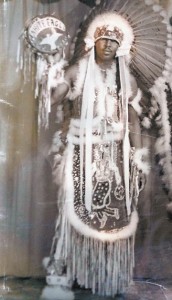Mardi Gras Indian Elder Isaac ‘Ike’ Edward passes
10th July 2017 · 0 Comments
By Geraldine Wyckoff
Contributing Writer
“I don’t want to be remembered as a Second Chief, I want to be remembered as a Flag Boy,” Isaac “Ike” Edward is quoted as saying not long before his passing. Edward, who masked Indian in the 1940s and 1950s, died on July 5, 2017 at the age of 94.
“I was a person who never liked to be up front,” Edward declared in a 2002 interview as he was about to be honored with the Mardi Gras Indians Hall of Fame’s prestigious Crystal Feather award.
As a teenager, Edward masked with the first Black Indian gang, the Creole Wild West, then led by the renowned Brother Tillman and soon rose to the position of flag boy with the Uptown gang. But Edward, along with about 15 or 20 other Indians, became discouraged with the Creole Wild West as the aging chief began hitting the streets later and later on Carnival day.“You know, we were young and we wanted to come out early in the morning,” explained Edward, who along with others left the gang to join the Golden Blades in which he also held the flag boy position that he loved. That association lasted just one year before Edward, along with the now-legendary chiefs Robert “Robbe” Lee and Lawrence Fletcher established the White Eagles. This influential gang, which was formed in 1948 at an uptown barroom, spawned a host of other gangs and has been led by other such notables as late big chiefs Donald Harrison Sr., Jake Millon and Eugene “Junior” Thomas.
“Everybody from the neighborhood used to mask with us,” remembers Edward of the gang that once boasted as many as 50 to 60 members.
“We used to love to be out there naked – with just an arm band, no shirts or nothing,” Edward once said with a laugh. “Crowns were made from turkey feathers purchased from local poultry stores. If they got white ones they’d dye them various colors. Indians headed to junkyards to shear off decorations from old beaded dresses to use for their designs. I was noted for my beading,” boasted Edward, adding that they’d decorate their tennis shoes with little bells. “You could hear Indians coming for three or four blocks.”
Although Edward retired from masking Indian in 1952 when he re-enlisted in the Army, his memories and love of the traditions remained strong. He recalled, for instance, when a fellow White Eagle, Bernard Lomax, wrote the now classic song “Shallow Water” and sang the verse in Creole. Edward also remembered when the Indians masked every Saturday night from Carnival to St. Joseph’s night (March 19th).
“It was a beautiful thing back in that time,” said Edward, who continued to be involved in the culture primarily through his involvement with the Young Guardians of the Flame under the tutelage of Cherice “Big Queen Reesie” Harrison-Nelson. He sewed and beaded butterfly patches for its members just as he did for his own, first green suit that he created when he was just 13 years old. The butterfly, with its beauty and sense of freedom, became Edward’s eternal symbol.
With Queen Reesie at his side, Mr. Ike also attended the 2015 and 2016 Mardi Gras Indian Council sponsored Indian Super Sunday parades. Those Black Indians who spotted him sitting in a chair on Martin Luther King Jr. Boulevard, shook their tambourines and bowed down to their elder who played a part in the continuum of the Black Indian tradition.
Funeral services for Isaac “Ike” Edward will be held at 1 p.m. Saturday, July 15, 2017 at Rhodes Funeral Home, 3933 Washington Avenue. The Golden Blades Mardi Gras Indian gang will act as pall bearers.
This article originally published in the July 10, 2017 print edition of The Louisiana Weekly newspaper.




